Discover the top-rated air purifiers of 2024 to provide a healthier living space for your family. Compare features, benefits, prices, and recommendations.
Do I Really Need Air Purifiers for a Healthy Home?
Did you know that indoor air is usually more polluted than outdoor air? Yikes! That’s why choosing the right air purifier is indeed crucial for maintaining a healthy home environment. Keep reading to explore the best air purifiers of 2024 that can help you breathe easier and create a safer space for your loved ones. From cutting-edge technology to budget-friendly options, we’ve got you covered. Let’s dive in and find the perfect air purifier to keep your family healthy and happy!
|
Best Overall |
Best Budget Friendly |
Best for Bedrooms |
Best for Specific Health Concerns |
|
Alen BreatheSmart Classic 75i |
Germ Guardian AirSafe + Intelligent Air Purifier |
Levoit Core 400S Smart True HEPA |
IQair HealthPro Plus |
|
HEPA filter, ionazation option, and carbon filter option |
HEPA filter, carbon filter, and UV-C technology to eliminate germs |
3-stage filtration system including HEPA |
HyperHEPA filter and V5 cell gas and odor filter (activated carbon + potassium permanganate) |
This post contains affiliate links. If you purchase through these links, I will earn a commission at no additional cost to you. Your support helps keep this blog running. All opinions expressed are my own.
Understanding Technology of Air Purifiers
HEPA filters: What they are and how they work
HEPA stands for high-efficiency particulate air, and these filters definitely earn their name! They can trap 99.9% of pollutant particles including allergens, dust mites and even bacteria! That is why HEPA filters are a must have, especially if you or anyone in your family suffers from allergies or asthma.
HEPA filters work by trapping particles in their densely packed fibers in three ways:
- Interception: The pollutant particles stick to the fibers in the filter when they come in contact.
- Impaction: The larger particles get stuck in the fibers
- Diffusion: The tinier particles bounce around the dense fibers, making it more likely for them to get trapped before passing through.
HEPA filters are top-notch when it comes to trapping particles, but lack in the odor elimination department. Check out carbon filters below to tackle the toughest odors in your home!
Activated carbon filters for odor removal
Carbon filters are made from porous carbon that absorbs odors, VOCs (volatile organic compounds), and other gas pollutants. These filters are especially great if you have pets, are renovating spaces of your home or painting.
UV-C light technology for germ elimination
UV-C lights can be a great addition to the filter you already have! Why? These lights neutralize living microorganisms by disrupting the DNA of different bacterias, viruses and pathogens.
The reason you would want to pair this with a filter is because the air would pass through the filter first, trapping the particles. Then, it would be exposed to the UV-C light which would neutralize the microorganisms left in the already cleaned air. So basically, these lights offer a safety net, or an extra level of protection. They are especially great during flu season!
Ionizers: Pros and cons
Although Ionizers would not be my personal choice for achieving clean air, they made the list so that you can make a well-informed decision before purchasing an air filtration system for your home!
Ionizers actually release negatively charged ions into the air which then attach to particles floating around. Those particles become too heavy to float, so they fall out of the air and onto the surfaces. But thats where they land… so the air may be “cleaner” but those particles are now all over your home. So unless you are avid about cleaning the surfaces of your home daily, this one may not be for you. Also, it is important to note that it can create ozone which is a lung irritant. Take a look at some of the pros and cons below.
- PROS
- Helps remove very small particles
- Can leave the air feeling fresher
- Typically quiet and energy efficient
- CONS
- Particles are left on the surfaces
- Some models produce ozone, which irritates the lungs
- Effectiveness varies
Think twice before investing in an Ionizer. If you do decide that you err on the side of preferring an ionizer, make sure it’s paired with another filtration system as well.
Pre-Filters
These are exactly what they sound like. A pre-filter is the first stage in the filtration process, although not all air purifiers have them. Pre-filters are a great additional step because they help trap large particles before they reach the HEPA filters. Many pre-filters are washable, meaning their life can be extended with proper care, further extending the life of the HEPA filter as well.
Smart features
Many air purifiers today come with a variety of smart features, so add this to your checklist if it’s something that interests you! The following options are worth looking into:
- Wifi compatible – Consider whether you want to be able to control your air purifier from your smart phone even if you are away from home. (This is a great option to consider if you travel a lot or are simply outside of the home a lot).
- Air quality sensor – monitors current air quality in your home
- Automatic mode – self adjusts based on current pollutant level
- Schedule settings – program it yourself to run at certain times
- Filter life indicators – get notified when it’s time to change the filter (I think everybody could benefit from this!)
- Voice control – yep, you can even connect your purification system to Alexa, etc.
With today’s technology, keeping the air in your home clean is easier than ever!
Best Air Purifiers for Large Living Spaces
Best overall
Alen 75i Air Purifier

- Extremely effective multi filtration system, capturing down to 0.1 microns
- Uses HEPA filter with option to purchase carbon filters
- Includes optional ionization setting (remember, this is not always recommended since it can produce ozone). But with this effective air purifier, you don’t even need this setting.
- Purifies up to 1,300 square feet
- Prices starting at $749
Runner-up
Rabbit Air MinusA2 Air Purifier
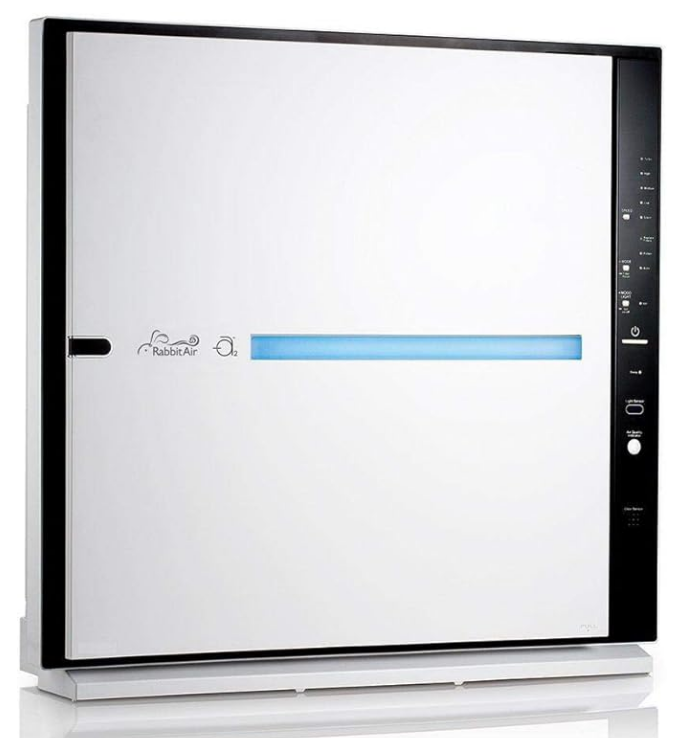
- Includes a multi-stage filtration system, capturing 99% of particles as small as 0.1 microns.
- Has pre-filter, HEPA filter, and carbon filter
- Offers the option for purchasing a customizable filter based on your personal needs (for example, if you have pets in the home, you can purchase the pet allergy filter).
- Again, this filter offers an optional ionization setting, but this is not recommended since it can create an irritating layer of ozone. The filter is still incredible affective without using this option.
Best Compact Air Purifiers for Bedrooms and Small Spaces
Best for bedrooms
Levoit Core 400S Smart True HEPA Air Purifier

- It’s nice and quiet, so it won’t bother you while sleeping! You might even find the gentle hum to be soothing!
- Auto adjusts fan speeds as needed
- Has a 3-stage filtration system including a HEPA filter
- Connects to wifi/application so it can be easily adjusted on your mobile device,
- Good up to about 400 sq ft.
Top choice for small apartments
- Great for large spaces, clearing the air in 775 sq ft. in less than 15 min, or the air in 3,720 sq ft in an hour.
- Removes 99.99% of pollen, and 99.97% of dust, pet dander, mold, and smoke.
- A DualProtection replacement filter is also available for boosted performance against smoke and odors.
- Quiet, even on its highest fan speed
- Energy efficient, using less energy than an incandescent light bulb
- Connects to wifi/application so it can be easily adjusted on your mobile device,
Blueair Blue Pure 311i+ Max
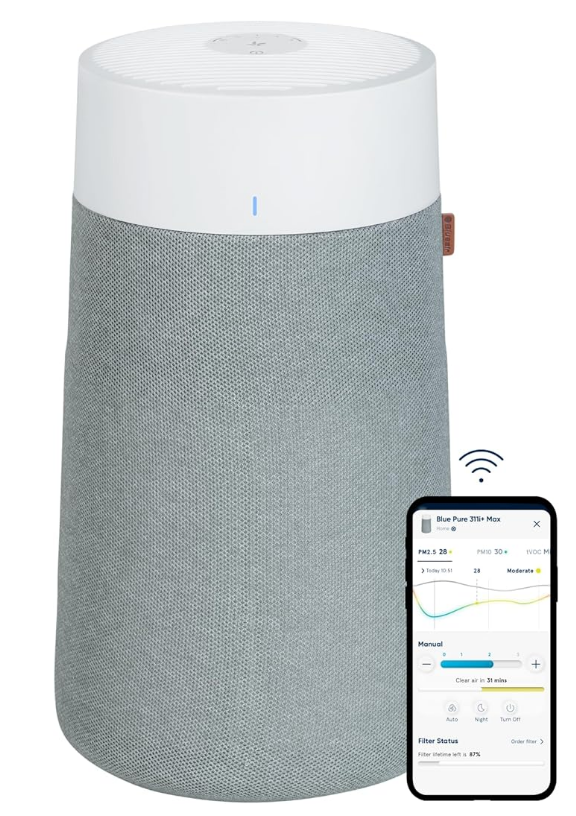
- This includes a washable fabric pre-filter as well as a HEPA filter.
- Can clear 99% of pollutants in 465 sq ft in under 15 minutes
- It is really quiet, even on high fan speeds
- Connects to wifi/application so it can be easily adjusted on your mobile device,
Best Pet-friendly option
Coway 200M True HEPA
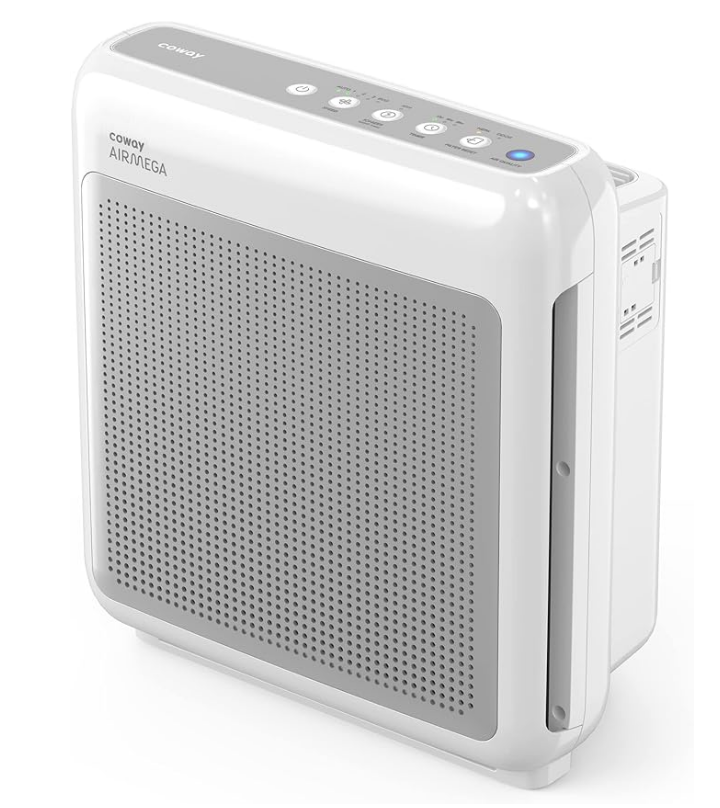
- This has an impressive 4 stage filtration system including a washable pre-filter, HEPA, deodorization, and vital ion filter
- It only covers about 360 sq ft, so it is great for small areas, but not large spaces.
- Perfect for pet owners since the pre-filter catches fur and other large particles while the other filters trap smaller particles and odors.
- Price around $200
Budget-friendly option
GermGuardian AirSafe + Intelligent Air Purifier

- Made with a HEPA filter as well as a carbon filter to remove particles, odors and some chemicals.
- Uses UV-C technology to eliminate germs
- Lightweight, making it a nice portable option
- Although this option is not great for a large space, it is great for small spaces, and it’s affordability offers the possibility for purchasing multiple to place throughout a home if needed.
- Price around $90.
Best Air Purifiers for Allergies, Asthma, and Other Specific Health Concerns
Best Overall
IQair HealthPro Plus
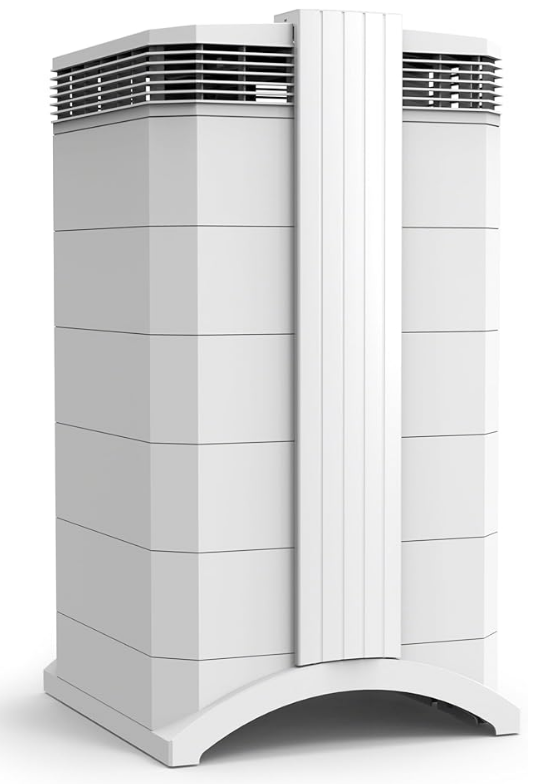
- This is great for large spaces, covering up to 1125 sq ft.
- Uses a hyperHEPA filter as well as a V5 cell gas a odor filter ( this is a combination of activated carbon AND potassium permanganate).
- Removes large and small particles, dust, allergens, mold, viruses, formaldehyde, odors, pet dander, and smoke.
- Exceptional for people with allergies and asthma.
- Price around $900
Runner Up
Blueair Classic 605
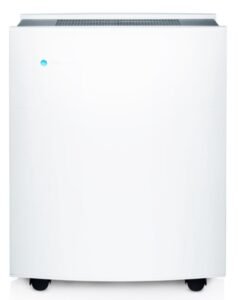
- Great for large spaces, clearing the air in 775 sq ft. in less than 15 min, or the air in 3,720 sq ft in an hour.
- Removes 99.99% of pollen, and 99.97% of dust, pet dander, mold, and smoke.
- A DualProtection replacement filter is also available for boosted performance against smoke and odors.
- Quiet, even on its highest fan speed
- Energy efficient, using less energy than an incandescent light bulb
- Connects to wifi/application so it can be easily adjusted on your mobile device
Budget-friendly Option
Blueair Classic Pro CP7i
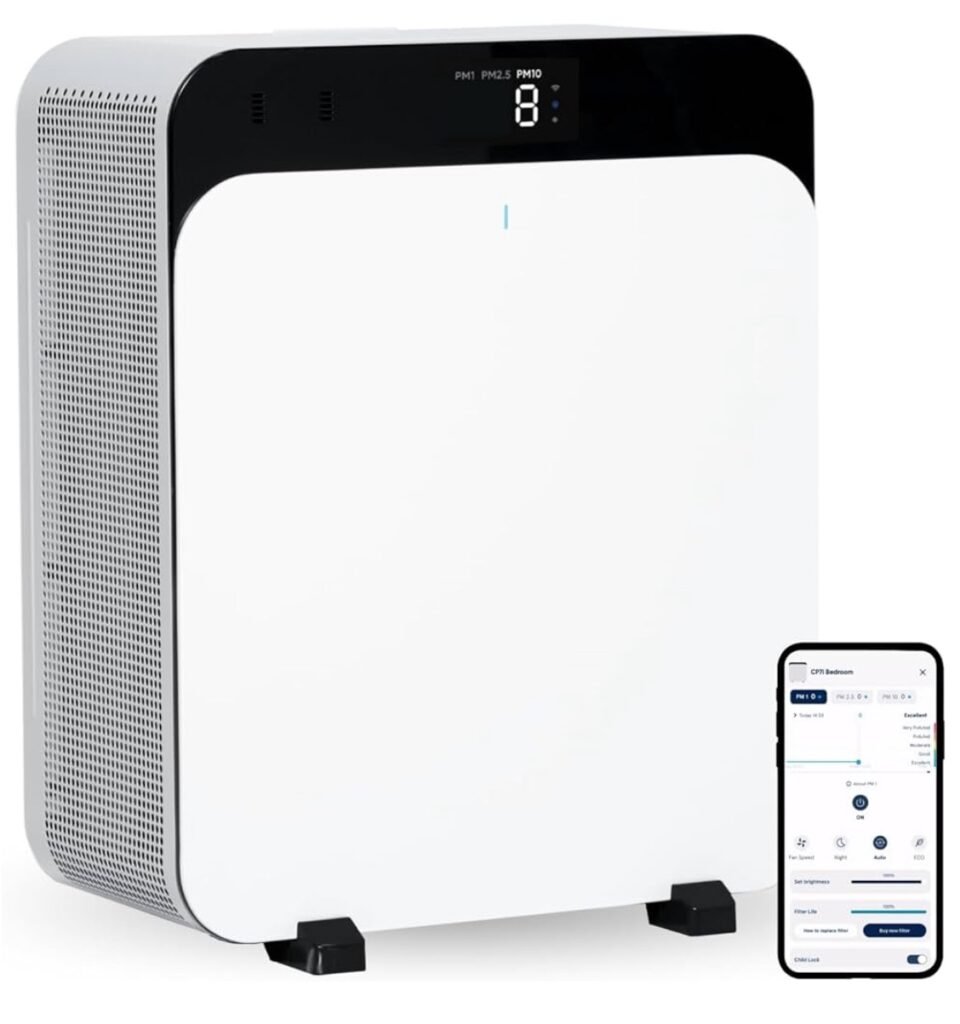
- Ideal for large spaces
- Cleans 580 sq ft in less than 15 minutes and 2,800 sq ft in an hour.
- 5 level filtration system removes 99.97% of airborne pollutants
- The HEPA Silent technology combines electrostatic and mechanical filtration to capture tiny airborne pollutants like pollen, dust and smoke, faster and quieter than traditional HEPA.
- Deactivates germs using Photon Pure lighting
- Connects to wifi/application so it can be easily adjusted on your mobile device
- Laser sensors to let you know air quality levels in your home
Maintaining Your Air Purifiers for Optimal Performance
Filter replacement for air purifiers
Consistent filter replacement is key to maintaining and maximizing your air quality. Thankfully, many modern air purifiers have filter life indicators which guide you on when you should replace the filters. Following this guide is necessary, because if your filter is dirty, your air purifier can’t do it’s best work. How often you need to replace the filters and average cost will depend on the type of filter you have. See below for some potential ideas.
- HEPA filters usually need to be replaced between 6 months to a year. The price range can be very wide depending on your model, but you could be looking at spending anywhere from a measly $20 all the way to a whopping $200.
- Carbon filters usually need more frequent replacements between 3-6 months, but they tend to be cheaper than HEPA filters, costing about $15-$50.
- Pre-filters (aka, the first filter particles come in contact with in an air purifier before being passed onto the more heavy-duty filter like HEPA or carbon). Some pre-filters are washable, which a money saving option! Either way, they need to be washed or replaced every 1-3 months and can cost around $10-$30.
It is good to remember that these are potential price ranges and not exact. Also, filter life depends on pollution levels, so if you are in a more polluted area or have pets, etc. these factors may affect the life of your filters.
Cleaning and maintenance tips for air purifiers
If you decide to invest in an air purifier, you’ll want to make it last as long as possible, and there are a few simple ways you can do just that!
- Vacuum the outside of the purifier to prevent additional dust buildup.
- Use a damp cloth to wipe down the outside of the purifier.
- Clean any reusable pre-filters monthly (even if it says it can go up to 3 months, a monthly clean will keep your system running smoother for longer.
- Check and clean fan blades every 3 months.
By investing a little extra time in cleaning your air purifier, you can end up saving a lot of money by extending its lifespan! Plus, the cleaner your purifier is, the more efficient it will be.
Maximizing efficiency for air purifiers
Did you know that something as simple as where you decide to put your air purifier can make a big difference in how efficient it is? Take the following tips into consideration when deciding which location would be best in your home and when to use it!
- Place the purifier where air circulates well (think open spaces away from corners, large objects or curtains)
- Elevate it 3-5 feet off the ground.
- For large spaces, consider using several smaller units instead of one large one.
- Let your purifier run 24/7 for consistent air quality.
- Use higher fan speeds for quick cleaning, then lower the fan speed for consistent running.
- Keep windows and doors closed when the purifier is running to reduce outdoor pollutants.
Get the most out of your air purifier by placing it in an optimal space and knowing how to make it run most efficiently!
Monitoring air quality with air purifiers
With modern technology, most up-to-date air purifiers come with air quality sensors already built in. These devices are great for helping detect pollution levels and automatically adjusting fan speeds based on the levels detected. While these sensors are helpful in ensuring your air purifier is doing its best work, you should always seek professional air quality testing if you have specific concerns.
When to upgrade or replace your air purifiers
Alas, even with all of the modern technology, cleaning efforts and maintenance you may invest in your air purifier, it will not last forever. But just how can you tell when it is time to move on? Ask yourself some of the following questions to help you decide.
- How old is it?
- Most air purifiers last 5-10 years with proper maintenance. So if you haven’t been keeping it clean or it has reached its lifespan, it is probably time to look at some new options.
- Does it still sound like it is running smoothly?
- Unusual sounds could indicate a failing motor.
- Is it still offering you optimal performance?
- If you notice more dust or allergies acting up even with regular cleaning and maintenance, your purifier might be losing efficiency.
- Is the technology as up to date as you would like for it to be?
- Newer models often offer better filtration methods and have a higher energy efficiency.
- Are your family’s needs still the same?
- Additions to the family (humans or pets) might call for a more powerful unit or more small units throughout the home.
- How much am I spending on repair costs?
- As your purifier ages, it might actually save you money in the long run to invest in a new unit rather than investing seemingly smaller amounts to keep the old one running.
Remember, a new air purifier might not be the best answer for your family right away. Ask yourself some of the following questions before purchasing a new unit.
Wrapping it Up
Investing in a high quality air purifier is just that, an investment! It may be more money than you feel like spending, but I promise you it is so important and worth it for your family’s health! By choosing the right model for your specific needs, you can significantly improve your indoor air quality and create a healthier living environment for those you love most. Remember to consider factors like room size, specific health concerns, and maintenance requirements/filter prices when making your decision! If you have any questions or want to share your favorite air purifier, leave a comment below!